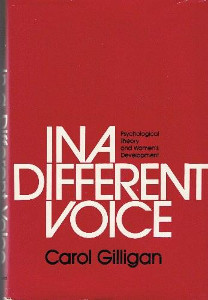In a Different Voice
 |
|
| Author | Carol Gilligan |
|---|---|
| Country | United States |
| Language | English |
| Subject | Gender |
|
Publication date
|
1982 |
| Media type | Print (hardcover and paperback) |
| Pages | 184 |
| ISBN | |
In a Different Voice: Psychological Theory and Women's Development is a book on gender studies by American professor Carol Gilligan, published in 1982, which Harvard University Press in March 2012 called "the little book that started a revolution".
In the book, Gilligan criticized Kohlberg's stages of moral development of children. Kohlberg had argued that girls on average reached a lower level of moral development than boys did. Gilligan noted that the participants in Kohlberg's basic study were largely male. She also stated that the scoring method Kohlberg used tended to favor a principled way of reasoning (one more common to boys) over a moral argumentation concentrating on relations, which would be more amenable to girls. This analysis by Gilligan about Kohlberg theory was later challenged, although the critique about Kohlberg's model not representing the full scope of the moral domain remains valid.
A different voice is a communication theory derived from the book, In a Different Voice by Carol Gilligan. Gilligan's theory of 'moral development [claims] that women tend to think and speak in a different way than men when they confront ethical dilemmas.' This theory also suggests the feminine ethic of care and the masculine ethic of justice.
Unlike the work which led her to her own studies, Gilligan's In a Different Voice purports to takes account of both men and women. She strives to emphasize that women, like men, are capable of thinking and acting in a manner associated with justice, and women with elements more associated with the value of care.
When Gilligan asked women, "How would you describe yourself?" she found that women define who they are by describing relationships. Men defined themselves by separation, or the use of "I" statements. She also found that men think in more violent terms than women. Gilligan compares these results to childhood fairytales. Where men fantasize about slaying dragons, women fantasize about a relationship. "Justice is ultimate moral maturity for adolescents (usually male) who see themselves as autonomous. Care is the ultimate responsibility of adolescents (usually female) who see themselves as linked to others."
Gilligan believes that psychology wants to think of women as men. This is described as something being "wrong" with women for not following the path laid out for men. Lawrence Kohlberg measured ethical maturity in moral dilemmas.
...
Wikipedia
